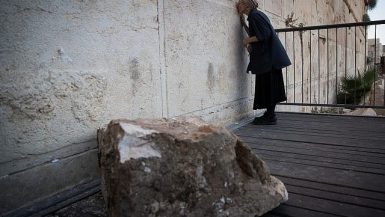The Israeli tourism industry is booming. In the first half of 2018, there have been 2.18 million visitors to Israel, which is 49% growth comparing to two years ago, and 69% growth of tourists from the Far East.
To boost the growth of the growing tourism industry, the Knesset will discuss the Tourism Services Bill on October 16, 2018. With the new law, the restriction of having to hire qualified tour guides will be relaxed. The “spiritual shepherds” of pilgrim groups, such as priests and pastors, will be allowed to legally act as a guide. This will especially benefit groups from countries which the usage of language is less common, for example, Chinese. And this bill will inevitably reduce the double cost of hiring a professional tour guide and a translator. With this change, the market price for Israel pilgrims will be lowered, and hence promote Israel as a new destination in the global tourism market.
After the Israeli-Palestinian conflict “Second Intifada” in 2000, tourism in Israel shrunk due to safety concerns. Hotel industry struggled with finances as tourists stopped coming to Israel. And if this bill passes, this will be a positive influence on hotels, restaurants, transportation, attractions, and consumer products markets.
Israeli tour guides opposed to the passage of this bill as this move will also break the balance of the current market. In Israel, a guide is a profession that requires thousands of dollars invested to take courses in archaeology, history, religion, plants, geography, architecture, art, first-aid, management, etc. After two years of hard work and passing a rigorous national exam, then you can have a license. And this license will be renewed by taking an exam every year. Under the current law, when a tour group from China, Egypt or Turkey, they must have a contract of hiring a local guide to apply for Israeli group tourist visa. And a qualified tour guide can charge up to $240 a day.
At present, there are more than 13,000 licensed tour guides, and about 5,000 of them are still active. However, because the country lacks a supervision system, these licensed tour guides find themselves competing with guides without a license, and the number is about 1 5.
The licensed guides don’t want the “Tourism Service Bill” to pass. It’s understandable that they have invested so much time and money in the past, and now the government should protect this profession and this system. And they feel that though pastors and priests know the Bible, they don’t know the land. So they don’t think these ‘spiritual shepherds’ can guide or cope with other situations on the ground.
And the licensed guides believe that they are presenting the positive image of Israel, so tourists may receive correct information on Israel. So their job is like an ambassador. For example, an illegal tour guide told a group that the map of Madaba in the old city of Jerusalem was stolen from Jordan. Or that the Western Wall was the only wall remained from the Second Temple era. Or that the two-handled jug is for receiving holy water at Kotel. And the worse is a guide told the group that what Hitler did to the Jewish people is what Israel is doing to the Palestinians now.
With my perspective and experience as a Chinese tourist in Israel, I think a tour guide is a profession. But we are in a strange era, a diploma cannot guarantee employment, and a monopoly market will not let a tour guide have more business. No one can control how people talk about Israel on the Internet. So tour guides on the ground, while their profession is not to be questioned, it is time to turn less academic and more entertaining. Their role is like actors or street performers. It requires more than professional knowledge, eloquence, personality, expression, as well as language skills and understanding of the audience. And most importantly, guides need good reputation and connections.
When it comes to Chinese speaking guides, let me just say learning a language is not easy. I met a Chinese-speaking Israeli tour guide, his Chinese pronunciation was understandable but I would say his Chinese speaking skill was similar to a high schooler. The speed of speech is too slow and the choice of vocabulary is poor for native speakers.
Sometimes, Chinese people understand English better than English-speaking people understand Chinese. Just like it’s hard for native English to listen to broken English, it is hard for native Chinese speakers to listen to broken Chinese. And honestly, this is my opinion, if someone’s Chinese is that fluent, he or she probably seeks another job with more perks than being just a guide, charging only up to $240 a day.
And it might be too naive to think an English-speaking Chinese student in Israel can qualify to be a good translator when a Chinese pastor is assumed “not good enough to be a guide”.
But the thing is, how will a guide convince the group that a local guide is more knowledgeable than the group’s own pastor? The tour guide I met was telling a story from the Bible, but he could not quote exactly the verses. It loses his credibility if he doesn’t know the Bible by heart.
Reality is harsh. It is not easy for a guide to cross culture and language barrier and know the audience in such as short time.
Dealing with Chinese groups isn’t easy. Why? Because in our culture, “guides” are not a high-paying job and they live based on commission. And intellectual property is considered free. Just like artists, musicians, chefs, these are professions for those who cannot become engineers, lawyers or doctors. He or she may be respected as an Israeli or as a Jew (because we think all Jews are smart), but not so much as a guide.
Rather than listening to slow commentary on history or politics, or repeating story rather than giving thoughtful insights, Chinese tourists prefer having more time taking pictures. Everyone’s schedule is fixed. And if we are talking about non-pilgrims, they probably aren’t spending their vacations for “lectures” which is believed can be found online.
If a priest or pastor is allowed to legally guide in Israel, I think this bill will be in the best interest for Chinese groups. It won’t be bad for overall economic growth either. I believe tour guides can’t be replaced, there’s so much they can do, for example, opening up an in-depth discussion on a single topic, sharing a personal story, or run a workshop or offer something with special experiences. There’s got to be a market not focusing on pilgrims. And I believe that in the free market, good products will always have a business.
If the law is passed, if the proceeds of the tour guide are indeed damaged during this transition period, I think the Israeli government can consider giving some subsidies and allowances to the licensed guides. Or through the power of the government, open up more academic or cultural exchange between countries. In this way, what the guides are capable of doing will not be stuck to 9-day tours.
Sources: Riled tour guides warn new bill could skew tourists’ Israel experience









